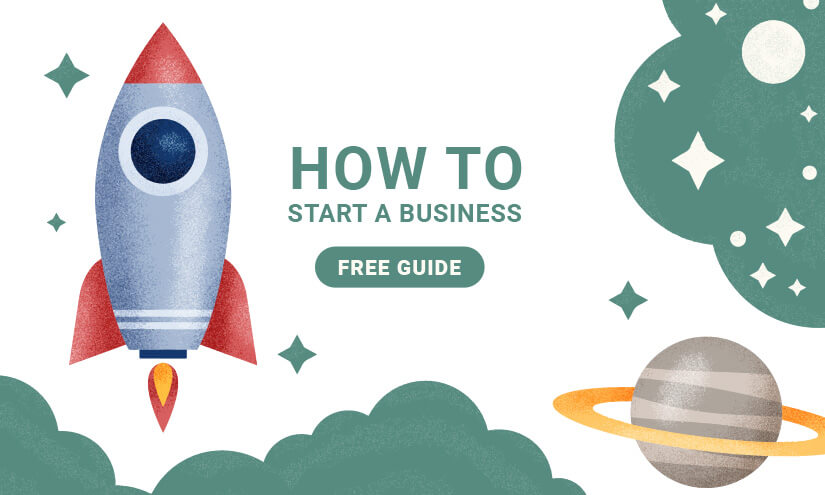Do you have these questions in your mind?
- Need to learn how to start a business?
- Worried about legal paperwork, taxes, permissions, and licenses?
- What about offline and online marketing strategies for your business?
In this article, you will find answers to all your questions. So please grab a cup of coffee, and let’s get started.
Table of Contents

How to make a Business Plan
A proper blueprint of your business can help you clearly picture the “what & how” of your business; by this, I mean what your business is going to be about and how you are going to execute your processes.
Below are the top points you should cover in a Business Plan:
Executive Summary
- Mission & Vision statement
- Customer Focus
- Financial Summary & 5-Year profit forecast
Company Profile / Owner Story
- A Brief introduction / History
- Products and Services
- Design (Interior & Exterior)
Market Analysis
- Target Market
- Market Trends
- Potential Client Profile
- USP of Company
- SWOT Analysis
- Test Data – Surveys, interviews, focus groups, and customer observation
- A/B Testing
Marketing Strategy
- Offline & Online Promotions
- Pre-Opening / Outdoor Ad Display
Pricing Strategy
- Value-based / Cost-plus
- Dynamic pricing
- Competition-based pricing
Management plan
- Hiring Plan
- Core Team Profile
Operations Plan
- Standard Operating Procedure (SOP)
- Functional & Administrative Roles
- Phases: Operational, Strategic, tactical, and contingency
Financial Plan
- Variant factors/ Assumptions
- Brake-even Analysis
- Projected Profit and Loss
- Yearly Profit & Gross Margins
- Projected Cash Flow
- Projected Balance Sheet
- Business Ratio
-
Operating costs vs income
Creating a business plan can be a complex task if you start fresh. You can consider hiring a business plan specialist to create a top-notch business plan.
You can find a business plan maker at Fiverr or Upwork.

What is Market Research, USP, Niche & Positioning?
Starting with Market research:
Market research is vital for any business to know its target market, consumer behavior, and competition in that field; therefore, it becomes integral for any business.
Your market research bucket list should include the following:
- The demand for the goods / services analysis
- Underserved or unaddressed demands
- Demographics and psychographics of the target market
- Competition analysis.
- Trends and challenges of the business
Business niche:
It refers to a focused or specialized area of a broader market that can help differentiate your business from the overall industry competition. Picking up the right niche is crucial for your business as it determines your market size and target customers.
Tips to find your business niche-
- Choose a general market
- Spot the opportunities
What’s missing, what people would like, and can you provide it - Conduct a competition analysis
- Narrow down your public market into a specific area.
USP:
Unique selling propositions (USPs), as the name suggests, are the unique characteristics of a product/ service that differentiate your product/service from the rest of the competitors.
Why do we need USP?
The market is always flooded with many options, be it a product or a service.
We always have multiple options to choose from, so if you want to compete in the market, you will need some unique utilities to create demand for your product/service and stand out.
It refers to strategies to create a brand image of products and services. It is what differentiates you from the competition. The primary purpose of market positioning is –
- Create brand awareness
- Communicate brand values
- Influences consumer perception of a brand

How find a perfect brand name for your business
What’s in a name ?
“Rose is a rose is a rose is a rose” – A rose by any other name would smell as sweet.”
– William Shakespeare
Unfortunately, the same cannot be applied to your business or brand name. Your business name is your identity.
It’s how you will be recognized in the industry, how your customer will see you, and yes, it’ll be the name you put on your Business Cards.
Here are some tips to help you get a cool name for your business:-
- Keep it Short and simple
- The title should be easy to pronounce & Hear
- Avoid location-based or service-specific words, if you are planning significant for future expansion
The business name you select may or may not be available. You may use the following tools to check the availability of name and domain extensions and in case you are stuck on a business name, look into these options:
- Namelix Name Generator
- Namechk.com
- InstaDomainChecker.com
- GoDaddy.com
- www.merriam-webster.com
- Dictionary.com
- Thesaurus.com
- www.leandomainsearch.com
You can also take help from:
- Family, friends, and colleagues' suggestions
- Ask for suggestions on forums like Quora or Reddit
- Consult a professional or a Brand Naming Agency
Once you find a suitable name for your business, visit your respective country's official website for Trademark registration to file it.
Looking for LOGO Design + Branding?
iMedia Ad Agency is an award wining Logo Design Company run by Sushant & Vijaya, offering professional logo designs for Start-ups / SMEs / Home Businesses Owners.
WHAT ALL YOU WILL GET IN YOUR LOGO PACKAGE?
- Full ownership of final Logo remains with the client
- 100% original logo artwork
- No internet copy-paste work
- Original sketch supplied
- Super High resolution Vector file formats
- Free 1 month logo backup support
- Telephone, chat, skype & email support
Get all Business Launch Solutions under one roof Logo, Corporate Identity, Invite, Stationary, Packaging, Broucher, Product Display, Web Design, Business Blog, Shopify Store, Startup Pitch Deck, Google SEO, Product Reviews, Business Articles, and Social Media Management.


How to register your company
The legal structure of your business shapes your taxes, personal liability, and business registration requirements, so you better choose carefully.
The leading company registration options are:
- Sole Proprietorship / Sole Trader
A typical structure for small businesses that makes no legal distinction between company and owner. All income and liabilities, like any debts or losses incurred by the business, go to the owner. The owner must pay business income taxes on their personal tax return. - General Partnership
It is similar to sole proprietorship; owners keep the profits and are liable for losses, but this structure is for two or more people. - Limited Liability Company (LLC)
This structure combines the characteristics of corporations with those of sole proprietorships or partnerships, but the plus point is owners/ partners are not personally liable for debts. - C Corp
This structure recognizes the business as a distinct legal entity, and the owner or owners are not individually liable for its debts. Rather than taking direct profit, Owners take profits through shareholder dividends. The corporation pays taxes, and the owners pay taxes on their dividends, sometimes called double taxation. - S Corp
Depending upon the tax status, an S-Corp can either be a corporation or an LLC. In an S-Corp business structure – profits, losses, credits, or deductions can be directly passed to shareholders; also, they have to pay taxes on their share of profit on their tax returns. - Nonprofit Corporation
A business that is organized for charitable, educational, or other public service purposes, rather than for profit. - Private Limited Company – UK
A business that is separate from its owners, with its own legal rights and responsibilities. It can be owned by one or more individuals or by another company. - Public Limited Company – UK
A business that is listed on the stock exchange and can be publicly traded. It is separate from its owners, with its own legal rights and responsibilities. - Community Interest Company (CIC) – UK
A business that is set up to benefit a specific community or group of individuals, rather than for profit.

Where to register for Business Taxes
Registering for taxes is a complex process and different for different countries.
We suggest consulting a professional, accountant, or lawyer to help you to ensure you are filing all your taxes right.
- For USA Business
Visit IRS Official Website
- For UK Business
Visit HMRC Official Website
Choose “where” to register your company
Where to register your business depends heavily upon your location because it affects taxes, revenue, and legal requirements.
Most people prefer to register their business in the state where they live, but if you have plans to expand, consider other locations as well, as some states might offer advantages for your business category.
As a new business owner, we suggest preferring an LLC structure as it provides liability protection and pass-through taxation feature while being more straightforward to form than a corporation.

How to Apply for Licenses & Permits
Permissions, insurance, and licenses are crucial; failing to comply with legal requirements may get you in legal trouble or hefty penalties. If you are starting fresh and do not know much about legal formalities, consider hiring a professional to help you check all the mandatory legal boxes.

How to Open a Business Bank Account
Banks’ formalities and services vary from company to company. Therefore, it is advised to keep an eye on bank offerings and services before choosing a bank for your business account.
Also, note that Every bank has a slightly different process for opening a business account.
- Employer Identification Number (EIN)
(or a Social Security number if you’re a sole proprietorship) - Your business’s formation documents
- Ownership agreements
- Business license
- A UK business address
- A company representative living in the UK (usually a director or an employee) who will be an account signatory
- A UK business plan showing why you need a UK business bank account
- Clear identification of all parties who own more than 10% of the business

Get a Business Insurance
- General liability insurance
Most comprehensive insurance of all, acting as an altogether solution for many business elements that may need coverage. It even protects against bodily injuries and property damages. - Business Property insurance
For protection against equipment and supplies-related damages - Equipment Breakdown Insurance
It covers the cost of replacing or repairing equipment that may have broken due to mechanical issues. - Worker’s compensation Insurance
It covers compensation to employees injured while on the job. - Property insurance
It covers your physical space damages, whether a cart, office or storefront. - Commercial auto Insurance
Covers all your company-owned vehicles - Professional liability Insurance
Covers all your “error or omission” in case any; by error omission, I mean any claims against you from your customer/client side for losses due to a mistake or error in your service. - Business owner’s policy (BOP) Insurance
It is an all-in-one insurance policy that combines several insurances.
For more info, you can look into these websites:
- https://www.cmris.co.uk (UK)
- https://www.lloydis.co.uk/insurance/commercial (UK)
- https://www.bswhealthplan.com (USA)
- https://www.statefarm.com (USA)

Payment Processing System (POS)
Gone are the days when we used to carry wallets, today, we mostly prefer to use cards for payment, therefore making the facility available becomes essential for any business for customer convenience.
Besides, the POS card processing system brings a number of benefits to business owners, such as –
- Track sales
- Accepts all types of payments
- Enable, accounts, and organizes transactions from different location
- Maintains a database of your inventory
- Help track employees’ sales performance
- Manages taxes
Here are suggestions for reputed POS System Providers:
Lightspeed
https://www.lightspeedhq.com
Square
https://squareup.com
i Zittle
https://www.zettle.com

How to Fund your Business?
Capital is a significant factor when it comes to business, and there are plenty of ways you can raise capital for your business:
Personal Savings:
Many entrepreneurs use their savings to fund their small capital businesses. It is a good option if you have to invest and don’t want to take on debt.
- Bank Loans
Banks and other financial institutions offer a variety of loans for small businesses, including term loans, lines of credit, and SBA loans.It can be a good option if you have a solid credit history and a large amount of capital.
- Government Grants
The government has launched a few financial assistance programs to help fund entrepreneurs. You may check out government websites for it.There are a variety of grants available for small businesses, including government grants, foundation grants, and corporate grants.
Small Business Innovation Research (SBIR) program US
Small Business Technology Transfer (STTR) program US
Minority Business Development Agency (MBDA) grants US
Rural Business Development Grants (RBDG) US
Women’s Business Ownership Assistance US
Native American Business Development Institute (NABDI) grants US
Start-Up Loans UK
Innovation Funding UK
R&D Tax Credits UK
Seed Enterprise Investment Scheme (SEIS) and Enterprise Investment Scheme (EIS) UK
Business Growth Fund UK
Regional Growth Fund UK
https://www.sba.gov/funding-programs/loans (USA)
https://www.gov.uk/business-finance-support (UK) - Angel Investors
Angel investors are high-net-worth individuals who invest their money in start-ups and small businesses. This can be a good option if you have a strong business plan and seek a larger investment.Offer potential investors your business share (an ownership stake) in exchange for funds. Remember that you’ll sacrifice some profit share and control over your business.
- Friends and Family
You may contact your friends and family for financial support as a business loan or investment. However, we recommend having legal advice in this case too. - Crowdfunding
Crowdfunding allows you to raise money from many people, typically through an online platform. Crowdfunding can be a good option if you have a unique product or idea and want to tap into a larger network of potential investors.Some popular Crowdfunding sites are:
– Kickstarter.com
– Patreon.com
– Crowdfunder.com
– GoFundMe.com
– Fundable.com
Other grants may be available that are specific to your industry or location. Therefore, it's a good idea to research the available grants and determine which ones you may be eligible for:
- Small Business Administration (SBA) grants
- State and local grants
- Industry-specific grants
- Nonprofit grants
- Private foundations and companies grants

FREE DOWNLOAD
Launch your Money Blog
Build a 24/7 money machine that you can create and grow from anywhere in the world you are…

How to do Offline & Online Marketing
Like there is a woman behind every successful man, there is the marketing behind every successful business. We may not be able to help you with women, but we can do with marketing strategies.
Some suggestions are as follows:
Online Marketing:
- Omnichannel Targeting
Today consumer marketing has shifted from Print Ads to Digital Marketing, from Telemarketing to Instagram Influencers. Try to create a presence on trending Media such as Facebook, Instagram, Pinterest, and Youtube.Create a presence on various Q&A forums like Reddit and Quora.
People now consume most of the content from their cell phones compared to other devices. Focus more on mobile-friendly approaches.
- Business Website / Blog
Times are changing; now, rather than asking an older man in the village, we check google for suggestions. Think about the market you can capture from google searches.Build your professional business website and focus on page / off-page SEO to boost your ranking on google SERP.
Your website not only acts as an online interface for your business but can also bring sales, use tactics like adding calls to action, upsells on your website, or try blogging pay-per-click marketing to get more convergence.
You can create your own website using services like:
– WordPress
– Wix
– Squarespace
Hire a freelancer or a professional to create a blog / website for your business and save your time. - Email marketing / e-newsletter
Send regular and personalized emails to customers and prospects.
- Build Customer Testimonials
Positive customer testimonials win consumer trust and build the credibility of your business. It’s like a digital form of mouth publicity that you can feature on your website or share on other social media channels. - Use Ecommerce Platforms
If you are a product-based firm, you can register with leading e-commerce sites to expand your reach and diversify your market, like Amazon, Etsy, Shopify, and eBay.
- Create a Community
A business is not all about sales but about building relations. Providing goods and services is one aspect of connecting with people, while the other can be forming a community with your customers.
Create a community using Instagram, Telegram, Twitter, Whatsapp Groups, or your website.
For local businesses, getting listed on Yelp, Google My Business, and online business directories can significantly generate business awareness and drive customers.
Offline Marketing:
- Business cards
Business cards come in handy when referring your brand to someone; you may initially distribute your business cards with your product/services. - Sponsor events
If organizing events look like a lot of work, consider paying to be a sponsor at events that are relevant to your target market. - Distribute pamphlets / Flyers
You may distribute flyers at your events, local clubs, tradeshows, and neighborhood.
- Competitions and Giveaways
Empower call to action with giveaways; for example, join our community, win a product, and get the latest updates on our services.Organize competitions on any trending issue and offer your products along with prizes.
- Press Releases
Do press releases about your new launches or events.
- Paid Ads
You can choose various forms of advertisement, from poster banners to TV and Instagram ads. You may select anything as per your budget. - Loyalty Programs
There is nothing better than a loyalty program to make your customer feel validated. You may provide special discounts / coupons as a part of the program to keep your customer tuned to your business.
Organize Events, Local Clubs, Local Meets, and Tradeshows.

How to Build Your Team
If you have just started a small, work-from-home office, you might not need any employees. But as you scale up your business, you will likely need members to help you with several tasks.
- Administration / Operation management
- Accounting and finance management
- Sales and Marketing teams
- Procurement / Vendor Management
- Research & Development team
- Quality / Customer service team
- Human resources management
- Logistics / Shipping
- Legal
- Indeed
- Glassdoor
- ZipRecruiter
Train your Team
Building a team is not just limited to hiring but also requires training. Every business has different clients, its own SOPs, and the work environment. The person you hire might have relevant skills but may not need a little taming as per the job role.
- Orientation Training
- Communication and Soft-Skills Training
- Onboarding Training
- Leadership Training
- Product / Technical Training
- Team Training

How to provide an excellent customer service
Customer satisfaction is the key to building good relationships with your customers.
Creating a positive, friendly environment by thanking your customer, solving their queries, and providing good after-sale service makes a happy customer, and a satisfied will likely return and spend more.
Here are some tips for creating maximum customer satisfaction:
- Know your customer expectation
- Make sure to solve all the customer quarries you receive
- Welcome all kinds of feedback, both positive / negative
- Make sure you have a quick and convenient grievance redressal service

Buying an old business Vs Franchisee Vs Own Brand from Scratch?
Starting a business doesn’t always have to be from scratch; you can consider buying an existing/old business or a franchise if you like. All the mentioned business models have pros and cons; let’s look at each option.
Buying an old business:
- The old business might have a ready customer base ready for you
- Maybe a little, but it does have brand recognition in the market
- You get a ready-made company set up
- We might need a better image / customer testimonials in the market
- Not suitable if you have something fresh under your sleeves
- It can be costly to understand the market
Taking Franchise:
Pros
- You get already established brand name and market
- You get the benefit of franchise advertising and marketing strategies
- Your franchisor may also help you reach potential customers through their database, website, and contact center
- It would help if you had your business recognized
- You will have to comply with the franchiser’s terms and conditions
- You never own the business; buying a franchise involves cost / fee. It could be a one-time, monthly, or yearly; it all depends on the deal and contract
Starting your own brand from scratch:
- You own your business / brand in all aspects
- It can be beneficial if you have a new business idea or a differentiated market niche
- You can shape and develop your brand image
- It takes time to establish / create the brand image of the business
- Requires more marketing / advertising costs for your business
Conclusion
Starting a new business requires careful planning and attention to detail. However, it’s not just about coming up with a great idea or product; many other factors contribute to a business’s success.
There is a lot to consider, from choosing a business name and setting up a legal structure to developing a marketing plan and managing finances.
But don’t let all these challenges discourage you!
You can turn your entrepreneurial vision into a thriving enterprise with hard work, dedication, and a little luck.
The key is to take things one step at a time, starting with a solid foundation and building upon it as you go.



















